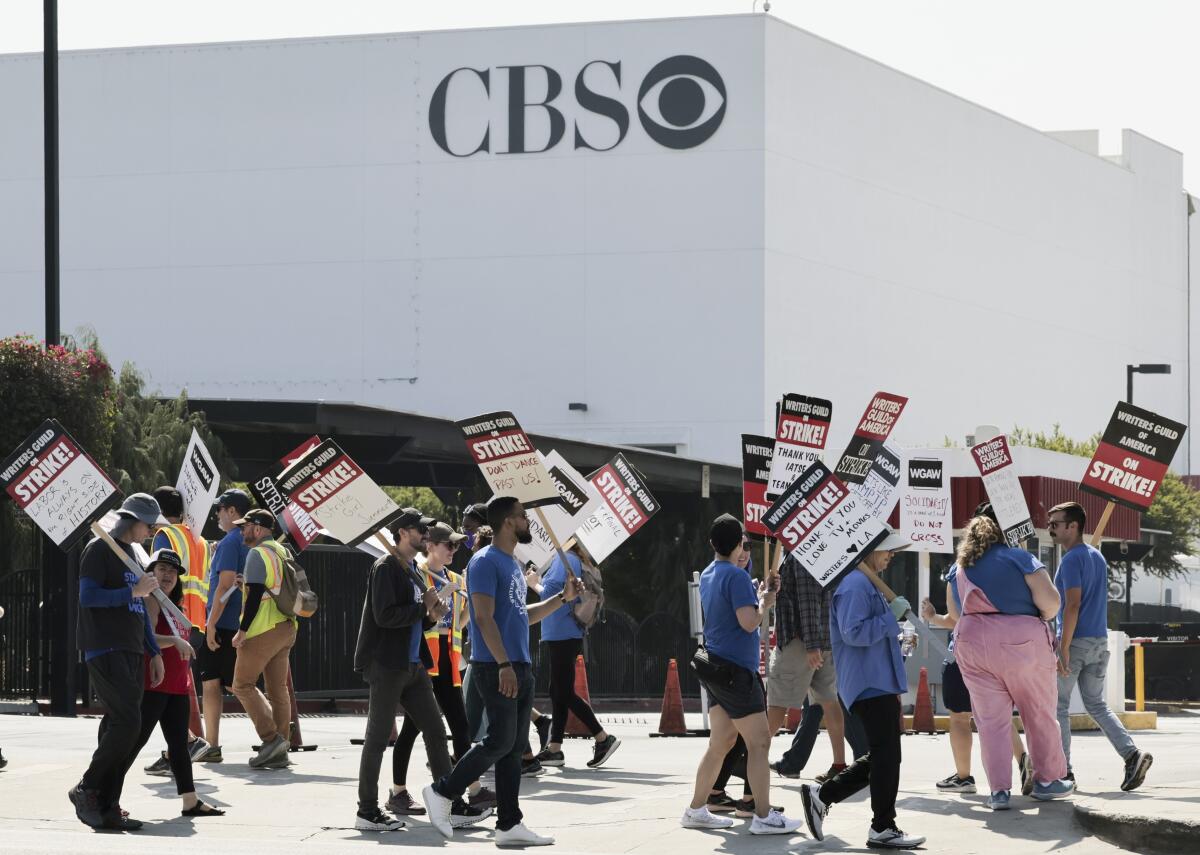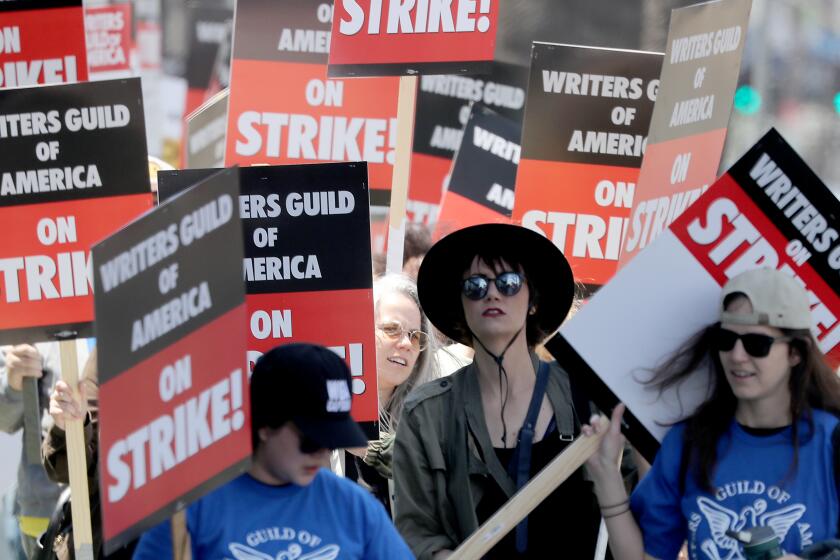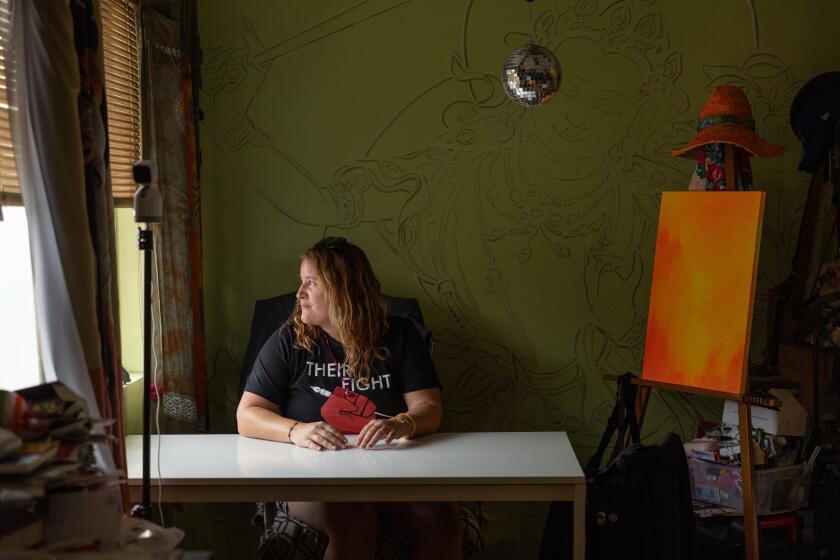WGA, Hollywood studios close to a deal on ending writers’ strike, sources say

- Share via
The Writers Guild of America and the major Hollywood studios are closing in on a deal that would end a 145-day strike that has roiled the film and TV business and caused thousands of job losses.
Lawyers for the two sides were haggling over the details of a possible agreement on Saturday during a meeting that began mid-morning, according to people close to the discussions who were not authorized to comment.
However, the union and studio alliance had not announced a deal as of early Saturday evening.
In a joint statement, the WGA and the studios said they would meet again Sunday. Studio sources told The Times the two sides hoped to finalize a deal then.
“Thank you for your continued encouragement as we press ahead to secure the best deal we can for writers,” the WGA’s negotiating committee said in an email to members Saturday night.
Saturday marked the fourth straight day of talks, which kicked off Wednesday with the heads of four major studios participating directly.
The 2023 writers’ strike is over after the Writers Guild of America and the Alliance of Motion Picture and Television Producers reached a deal.
Should the companies reach a pact this weekend, they won’t immediately restart productions. The entertainment company leaders still must turn their attention to the 160,000-member performers union, SAG-AFTRA, to accelerate those stalled talks in an effort to get the industry back to work.
The thorniest issues in the long-running labor dispute have included language governing the use of artificial intelligence, minimum staffing in writers rooms and the establishment of residuals to reward scribes based on viewership of streaming series.
The work stoppage began in early May and gained momentum as actors led by SAG-AFTRA joined writers on the picket line in mid-July, further shutting down film and scripted television productions and hobbling studios’ ability to promote would-be blockbuster movies.
Any agreement on a new three-year film and TV contract would have to be ratified by a vote of the WGA’s 11,500 members, who have strongly supported the walkout and have enjoyed unusual levels of solidarity from fellow unions amid the nation’s “hot labor summer.”
Crew members are expressing frustration at the length of the writers’ and actors’ strikes as Hollywood workers struggle to pay for rent, food and healthcare.
There has been significant pressure on both sides to reach an agreement in recent weeks. Many Hollywood industry workers have struggled to pay their rent and bills, with some moving out of state to make ends meet. Studios have also felt the financial pain, modifying their film slates and leaning on live sports and unscripted television.
WGA negotiators met with studio representatives Wednesday for the first time since a disastrous meeting in late August. This week, top executives joined the proceedings: Walt Disney Co.’s Bob Iger, Netflix’s Ted Sarandos, Warner Bros. Discovery’s David Zaslav and NBCUniversal’s Donna Langley.
Friday’s marathon session started at 11 a.m. at the headquarters of the Alliance of Motion Picture and Television Producers — which represents the big entertainment companies — in Sherman Oaks. The meeting ended at about 8:30 p.m., amid growing hopes that the sides would be able to reach an accord before the Yom Kippur holiday.
The apparent progress marked a stark contrast with the last round of talks, which started in August after three months of striking.
Negotiations fell apart after an Aug. 22 meeting with the four leading CEOs — Iger, Zaslav, Langley and Sarandos — which writers’ representatives described as a “lecture” and a browbeating session in which they were pressured to accept an Aug. 11 proposal from the AMPTP.
After the meeting, the alliance released a summary of its proposal, causing an uproar among writers who saw it as a tactic to go around the WGA’s negotiating committee. The effort deepened the mistrust between the two sides.
Studio brass thought the move would allow writers and the larger community to see that the AMPTP had given substantial ground in an effort to reach a deal.
The studio’s proposal offered wage increases and signaled a willingness from the alliance to negotiate on topics it previously considered off the table, such as sharing of viewership data with the WGA and staffing in writers rooms.
But the WGA’s negotiating committee felt the proposal did not go far enough. Writers on the picket lines were not impressed, calling the studios’ proposals “half-measures.”
Frustration among workers, including film crew workers, continued to build as the strikes stretched beyond Labor Day.
Political leaders including Gov. Gavin Newsom, L.A. Mayor Karen Bass and state Treasurer Fiona Ma also weighed in, urging the parties to settle the dispute.
For weeks, the two sides remained at a standstill, arguing over whose turn it was to make a counteroffer. The WGA’s negotiating committee even suggested that some studios might be willing to break from the alliance and negotiate separately with the guild, exploiting potential fractures in the alliance. The AMPTP rejected that notion.
This week, though, talks got serious.
Studios wanted to get a deal done by early October to salvage their 2024 film slates, which would require them to be back in production soon. They’re also hoping to salvage what they can of the 2023-24 television season.
Even once a new agreement is reached, it’s unlikely that production will restart right away. The studios will still need to reach a new contract with SAG-AFTRA. SAG-AFTRA and the AMPTP have not held formal talks since the actors’ strike began.
More to Read
Inside the business of entertainment
The Wide Shot brings you news, analysis and insights on everything from streaming wars to production — and what it all means for the future.
You may occasionally receive promotional content from the Los Angeles Times.














